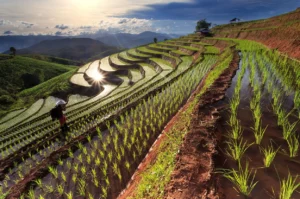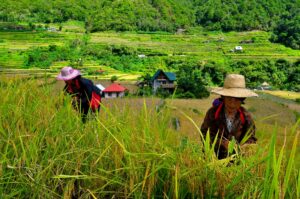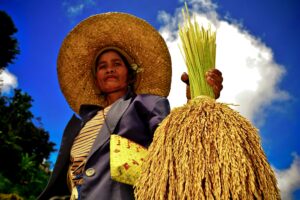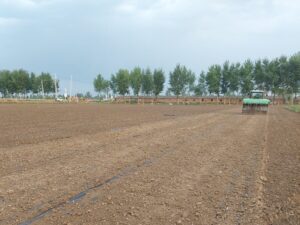Generating relevant and useful research solutions to agricultural problems is only halfway to improving farm productivity and sustainability, and helping raise farmers out of poverty. These solutions need to get to farmers, who, in turn, learn and adopt them to realize their full potential benefit.
Extending rice research
In 2002, the International Rice Research Institute (IRRI) discovered that, while it had vast amounts of valuable rice-farming knowledge, the information was not really accessible to the wider extension community of government and non-government organizations, universities, and the private sector. To bridge this gap, the Institute formed the Rice Knowledge Bank (RKB), which brought together all of IRRI’s current validated rice-farming knowledge relevant to the extension community, and made it available in a one-stop-shop on the Internet and on CD.
The RKB covers the whole seed-to-market cycle of rice production that includes seeds, land preparation and crop establishment, water management, integrated nutrient management, integrated pest management, harvesting and threshing, drying, storage, milling, processing, and economics and marketing.
Moreover, the RKB presents information in the form of fact sheets, which can easily be printed out. It also prepares online training courses designed with non-scientists in mind, to ensure effective communication with users.
Aside from providing practical information on rice, the RKB also offers information that aims to build the skills of extension workers and help them improve their capacity to teach farmers.
Noel Magor, head of the Training Center at IRRI and one of the leaders in developing the RKB, explains that the RKB complements the suite of face-to-face and online/CD training programs that IRRI runs for extension officers.
“We train extension officers and others worldwide to teach them the latest best practices in a range of rice-related topics,” Dr. Magor said. “When these people head back to their home countries and start providing training and information to rice farmers, they can draw upon the resources of the Rice Knowledge Bank to support them.
“This is the real power of the Rice Knowledge Bank—helping provide information to rice farmers through established local extension mechanisms and information delivery routes,” he added.
Getting local
Stage one of the RKB focuses on providing information exclusively generated from IRRI research. Although considered high-quality, current, and scientifically credible, IRRI’s research is recognized as only part of a bigger picture, because two important ingredients are included: national research results and indigenous knowledge.
In 2005, IRRI started to work with its partners in the national agricultural research and extension systems (NARES) and planned country-based versions of the RKB to complement the overarching IRRI research component.
This effort has since culminated in the launching of the country-based RKBs for all the major rice-growing countries such as Nepal, Sri Lanka, Bangladesh, Myanmar, Thailand, Lao PDR, Cambodia, Vietnam, China, the Philippines, and Indonesia.
The team has also started to apply the RKB concept in India. Each national RKB is translated into the country’s respective language and is developed and managed by the pertinent local authority to include validated information that is locally relevant and owned.
For example, the Bangladesh Rice Knowledge Bank (BRKB) was established in 2004. Since then, 76 government and nongovernment extension providers have been trained on how to use it, 3,860 participants in 95 rice production training courses have been informed about it, 900 CDs have been distributed, and more than 20,000 people have visited the BRKB Web site.
“The Bangladesh Rice Knowledge Bank is a one-stop repository of rice information including a training module, rice production handbook, and flip charts,” said Dr. Jahirul Islam, chief scientific officer and head of the Training Division at the Bangladesh Rice Research Institute.
“It is well accepted and used by the rice community as it is reader-friendly,” he added. “The government is also planning to use it through telecenters at the farm level, to improve the country’s rice production. The Bangladesh Rice Knowledge Bank is a cost-effective new route toward food security.”
After Asia, the next frontier for the RKB is Africa. Rice is becoming a major crop for eastern and southern Africa, with regional demand growing at 6% every year.
In 2009, in collaboration with the Africa Rice Center (WARDA), the RKB concept is being introduced to six rice-growing African countries.
More countries are expected to follow shortly. This will form part of WARDA’s grand plan to develop a Rice Information Gateway for Africa.
The impact
More than just a Web site or CD, the RKB is a gateway to information and resources to help improve the knowledge and capacity of extension officers, who, in turn, can tailor the delivery of information to their local farming communities.
National RKBs have also greatly improved the use of national research, making the best knowledge readily available to the extension community.
In Thailand, an evaluation of the RKB has shown that extension officers saved, on average, about US$2,500 a year each when they used the RKB. This is based on the time they saved searching for information and revisiting farmers, and on the costs they saved on photocopying. More importantly, Thai farmers who used the RKB had fewer costs and higher revenue. They had a total net income of $60 per hectare more than non-RKB users.
The evaluation also gave suggestions on how to increase the use of RKB information, including encouraging farmers to participate in RKB meetings and improving the general knowledge of farmers about computers.
This feedback will be used to further improve the extension of the RKB program. In Vietnam, farmers, extension practitioners, and other users appreciate the Vietnam RKB because, for the first time, they have a bank of comprehensive, up-to-date, and easily understood rice knowledge, which was previously scattered across various sources. With the Vietnam RKB available online, extension staff can access and select the updated information from their RKB to develop training materials and handouts for their work. More than 500,000 people accessed the Vietnam RKB online in its first 4 months of operation. Where the Internet is unavailable, users can access the Vietnam RKB by using CDs that are reproduced for distribution.
Furthermore, the Cambodian RKB was officially launched by the Ministry of Agriculture, Forestry, and Fisheries. The event was followed by training activities in 15 target provinces. According to Mr. Ty Channa, head of the Training and Information Center at the Cambodian Agricultural Research and Development Institute (CARDI), the Cambodian RKB has provided effective support for field-level demonstrations for farmers. CARDI’s efforts in the development of new rice varieties have been strengthened by the Cambodian RKB. Cambodian farmers are now using new rice varieties on 48% and 87% of the total cultivated areas in the wet and dry season, respectively.
With such demonstrated successes, the RKB concept is now also being used as a model for other crops and livestock. Particularly, the International Maize and Wheat Improvement Center (CIMMYT), based in Mexico, is partnering with IRRI to build upon the successes of the RKB with other cereals and to jointly launch the Cereal Knowledge Bank.








